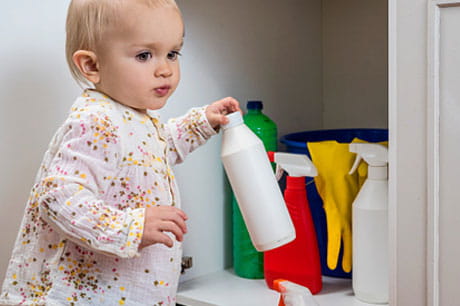To kids, many household cleaners look good enough to eat
Disinfectants can be dangerous
When you’re trying to tackle spring cleaning around your home, it’s easy to focus on checking items off your to-do list and overlook the fact that some of those household cleaners you use to disinfect the countertops, dust the bookshelves or polish the floors look less like cleaners and more like juice or candy to curious kids.
Over 300 kids go to the emergency room each day because they’ve been poisoned, according to the Centers for Disease Control and Prevention.
“Unfortunately, many common household cleaners look good enough to try, and they’re often kept at eye level and within easy reach of small, very curious children,” said emergency medicine physician Jason Brown, DO.
The cleaners you keep under your kitchen or bathroom sink can easily be confused with popular kids’ drinks or candy. Here are some lookalikes:
- Window cleaner could be confused for colorful, flavored drinks.
- Floor polish might look like apple juice.
- Lemon-scented disinfectants not only smell good, they also look like lemon-lime sports drinks.
- Powder ant or bug poison sprinkled on your kitchen floor could look like sugar or candy.
- Laundry detergent pods could be confused with candy. In the first quarter of 2017, poison control centers received over 2,000 reports of laundry detergent pod exposure, according to the American Association of Poison Control Centers.
Deep cleaning during the spring also means you might use more heavy-duty chemicals like bleach, drain cleaner, rust remover or oven cleaners. These strong chemicals can be fatal if they’re ingested and can cause chemical burns.
“If you’re using strong chemicals during your spring cleaning, wear protective clear like rubber gloves, and turn on fans and open windows to ventilate the space for the safety of everyone in your family,” said Dr. Brown.
There’s no such thing as “childproof”
To keep household cleaners out of your kids’ hands and mouths, store them on a high shelf or in a locked cabinet. To a curious child, even bottles of drain cleaner or bleach that have “tamper resistant” caps can be broken into with enough time.
“It might seem inconvenient to store cleaning products in an out-of-the-way place, but it will only take you a few extra seconds to unlock a cabinet with cleaning products; when they’re high up or locked away, they’re out of sight, out of mind,” said Dr. Brown.
Household cleaning products, chemicals, pesticides and insect repellents should also be stored in their original packaging. Never use cups, jars or food storage containers to keep poisonous cleaners.
When it’s time to clean, keep products nearby. If you have to break from cleaning for some reason, keep an eye on where your kids are playing.
Despite your best efforts to keep poisonous cleaners away from children, it may still happen. If your child has accidentally ingested poison and is unresponsive, call 911. Otherwise, call the Poison Help Number, 800-222-1222, which will direct you to the nearest poison control center.
“A poison control specialist will help you determine whether you should take your child to the emergency room,” said Dr. Brown.
Jason Brown, DO, sees patients at Geisinger Wyoming Valley Medical Center’s emergency department in Wilkes-Barre.

